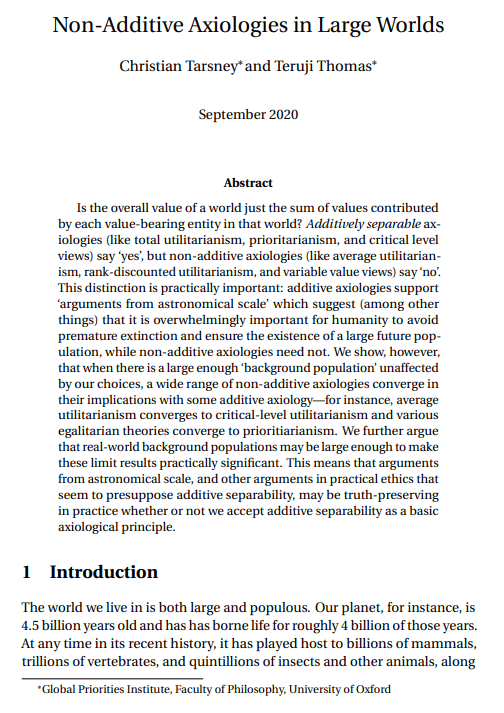Non-additive axiologies in large worlds
Christian Tarsney and Teruji Thomas (Global Priorities Institute, Oxford University)
GPI Working Paper No. 9-2020, forthcoming at Ergo.
Is the overall value of a world just the sum of values contributed by each value-bearing entity in that world? Additively separable axiologies (like total utilitarianism, prioritarianism, and critical level views) say ‘yes’, but non-additive axiologies (like average utilitarianism, rank-discounted utilitarianism, and variable value views) say ‘no’. This distinction is practically important: among other things, additive axiologies generally assign great importance to large changes in population size, and therefore tend to support strongly prioritizing the long-term survival of humanity over the interests of the present generation. Non-additive axiologies, on the other hand, need not support this kind of reasoning. We show, however, that when there is a large enough ‘background population’ unaffected by our choices, a wide range of non-additive axiologies converge in their implications with some additive axiology—for instance, average utilitarianism converges to critical-level utilitarianism and various egalitarian theories converge to prioritiarianism. We further argue that real-world background populations may be large enough to make these limit results practically significant. This means that arguments from the scale of potential future populations for the astronomical importance of avoiding existential catastrophe, and other arguments in practical ethics that seem to presuppose additive separability, may succeed in practice whether or not we accept additive separability as a basic axiological principle.
Other working papers
A non-identity dilemma for person-affecting views – Elliott Thornley (Global Priorities Institute, University of Oxford)
Person-affecting views in population ethics state that (in cases where all else is equal) we’re permitted but not required to create people who would enjoy good lives. In this paper, I present an argument against every possible variety of person- affecting view. The argument takes the form of a dilemma. Narrow person-affecting views must embrace at least one of three implausible verdicts in a case that I call ‘Expanded Non- Identity.’ Wide person-affecting views run into trouble in a case that I call ‘Two-Shot Non-Identity.’ …
A paradox for tiny probabilities and enormous values – Nick Beckstead (Open Philanthropy Project) and Teruji Thomas (Global Priorities Institute, Oxford University)
We show that every theory of the value of uncertain prospects must have one of three unpalatable properties. Reckless theories recommend risking arbitrarily great gains at arbitrarily long odds for the sake of enormous potential; timid theories recommend passing up arbitrarily great gains to prevent a tiny increase in risk; nontransitive theories deny the principle that, if A is better than B and B is better than C, then A must be better than C.
How to neglect the long term – Hayden Wilkinson (Global Priorities Institute, University of Oxford)
Consider longtermism: the view that, at least in some of the most important decisions facing agents today, which options are morally best is determined by which are best for the long-term future. Various critics have argued that longtermism is false—indeed, that it is obviously false, and that we can reject it on normative grounds without close consideration of certain descriptive facts. In effect, it is argued, longtermism would be false even if real-world agents had promising means…

